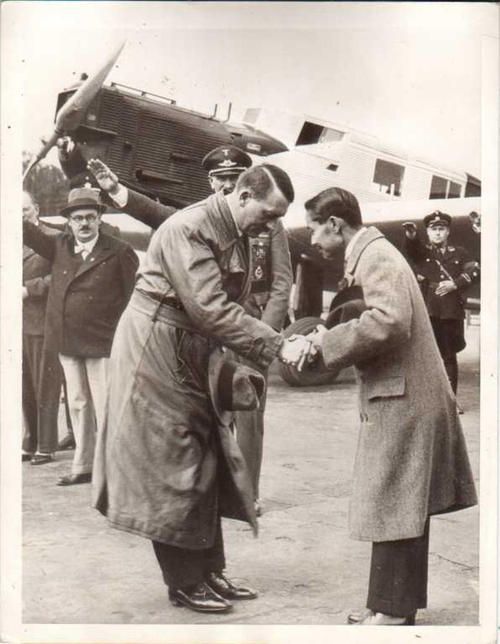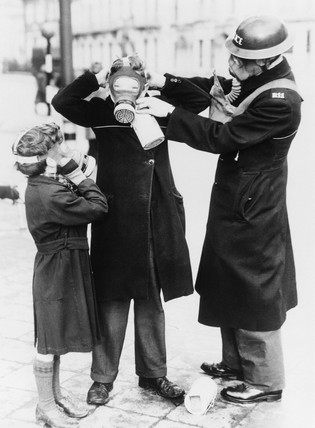Monday 17 February 1941
 |
| Adolf Hitler and Japanese Ambassador Hiroshi Oshima. |
East African Campaign: The South African 5th Infantry Brigade continues attacking toward Mega, while the 1st Infantry Brigade manages to cross the Juba River at Yonte against fierce Italian opposition.
European Air Operations: The Luftwaffe raids London with 50 bombers, its largest raid in some time. RAF Bomber Command stays on the ground.
 |
| Empire Knoll, which runs aground and is lost today. |
The weather is terrible. This causes all sorts of problems both for ships and for crews abandoning their sinking ships.
U-103 (Viktor Schütze) torpedoes and sinks 10,455-ton tanker Edwy R. Brown. The tanker is a straggler behind Convoy HX 107 in the North Atlantic shipping lanes.
U-69 (Kptlt. Jost Metzler) is on its first patrol operating out of Kiel southwest of the Faroe Islands when it spots a freighter. It is 8456-ton British freighter MV Siamese Prince, which becomes U-69's first victim. There are no survivors even though Metzler sees them take to the lifeboats - survival in the frigid ocean with storms and winter gales is problematic at best. Everybody (57 men) onboard perishes, and Admiralty searches by several destroyers find nothing and nobody.
British 307 ton collier Kyle Rona is sailing from Maryport for Portreath when it just disappears. None of the seven men on board, including Master Frederick Cook, survives. It may have hit a mine or broached deep and took water or...
British 156 ton freighter Ren Rein hits a mine off Falmouth, Cornwall in the English Channel and sinks. There are two deaths.
British 5817 ton freighter Casamance runs aground off Skinningrove, Yorkshire. The ship breaks in two and is written off. There are 38 survivors and 9 deaths.
British 2824 ton collier Empire Knoll comes aground due to the winter gales at Tynemouth in County Durham. The ship winds up on the old North Pier foundations there and is holed. It is a total loss.
Portuguese schooner Patriotismo sinks in the rough winter weather off Peniche. There are one death and seven deaths.
German raider Pinguin, in the south Atlantic, is joined by German supply ship Alstertor. Together, they sail for the Indian Ocean.
Admiral Sir Percy L.H. Noble becomes the new commander of the Royal Navy Western Approaches Command.
Convoys WS 6A and 6B (Winston Special) departs from various British ports. It includes numerous transports bound for the Middle East.
Convoy TC 9 departs from Halifax with numerous troop transports. They don't know it, but German heavy cruisers Gneisenau and Scharnhorst are lurking just north of the shipping lanes looking for good targets.
Convoy BN 16 departs from Aden.
Destroyer HMS Avon Vale (L 06, Lt. Commander Peter A. R. Withers) is commissioned.
Light cruiser USS Birmingham is laid down.
 |
| British guard duty west of Benghazi, 17 February 1941. |
Colonel Leclerc in southwestern Libya is heading for their ultimate target of Kufra. Leclerc has about 350 men, but the Italians are aware they are coming. The Italian Saharan company of 70 men intercepts Leclerc's force with 20 mm guns in ten armored AS37 cars. After a vicious firefight, the French lost many of their trucks but are able to continue forward when the Italians at Kufra stay inside their fort and don't help the Sahariana. Leclerc's men surround the fort, El Tag, and place their only artillery piece, a 75 mm gun, about 3000 meters from the walls. The French also place several 81 mm mortars about 1500 meters from the fort. The Saharan company attacks again but is beaten off again. The French settle down to a siege.
Turkish/Bulgarian Relations: The two nations formally sign their nonaggression pact. While at first, this might seem favorable to the British, in fact, it is designed to allow Hitler to move troops through Bulgaria to invade Greece without Turkish interference. British Prime Minister Winston Churchill has been trying to cajole the Turks (and their 38 divisions) into joining the British side, but this move effectively ends that attempt for the time being.
German/Japanese/British Relations: Japan makes an offer to mediate the European conflict, just as it has been mediating the border war in Indochina. Nobody takes Japan up on the offer.
General Oshima arrives as minister to Germany, his second appointment there. Oshima is viewed by the Germans as very sympathetic to their war aims.
German Military: Adolf Hitler is thinking big. He dreams of capturing India from the British, and in fact, has been sending presents (such as a motorcar) to some princes in the region. He orders his military staff to explore the feasibility of advancing through Afghanistan to India.
 |
| "Cunningham, Admiral of the Mediterranean." February 17, 1941, | Vol. XXXVII No. 7 (Cover Credit: ERNEST HAMLIN BAKER). |
During the war council meeting today, Churchill cautions against worrying about "divisions" in the military (as opposed to brigades or corps and so forth). The gist of his oration on this point is that the term "division" can refer to vastly different forces.
Churchill also memos CIGS General Ismay and Cabinet Secretary Sir Edward Bridges cautioning them not to reveal the source of their information about Japanese decrypts, information which apparently was sent around the office. He wants all copies tracked down and the information suppressed, all the way down to identifying what copying machine was used and "who gave the orders for it to go in this form." Naturally, he doesn't want the Japanese to know the British have broken their codes.
Ireland also is on Churchill's mind. He memos General Ismay that the Germans might invade Ireland before they invade England, which would give the British the "immediate pretext" to invade Ireland - something that Churchill appears eager to do. He urges Ismay to use "every scheme of which military and naval ingenuity are capable to move more troops across the Irish Channel" whether the Irish want them there or not. In fact, the Irish have made plain that they do not want to be involved in the British war.
Churchill also memos Viscount Cranborne and Sir Kingsley Wood to implement economic sanctions against southern Ireland "to make Southern Ireland realized how great a wrong they were doing to the cause of freedom by their denial of the ports" to the Royal Navy. At this point, it seems as if Churchill is much more interested in invading Ireland than Hitler ever is.
 |
| Policeman helping children with their gas masks, Brighton, 17 February 1941. |
This region [Oceania] has sufficient natural resources to support from 600,000,000 to 800,000,000 people. I believe we have a natural right to migrate there.Times, Feb. 18, 1941, p. 1. Oceania, of course, includes Australia, the Dutch East Indies, and New Zealand. Thus, the Japanese basically are telling all Europeans that they are not wanted in the Pacific and that they feel entitled by "natural right" to occupy lands now claimed by others.
US Government: The US Senate begins debating the Lend-Lease bill.
Australian Government: Prime Minister Robert Menzies is continuing his epic, month-long journey from Melbourne to London. Today, he stops over in Lagos, where he meets fellow Australian Sir Bernard Bourdillon, the Governor. Bourdillon blames the British fiasco at Dakar in September 1940, and a related incident in which French cruisers were allowed to cruise out of Mediterranean past Gibraltar to reinforce the Vichy French forces there, on unclear instructions from Winston Churchill. To be fair, Bourdillon has a point, as the British attitude toward Vichy France seems confused at best. Menzies seems quite impressed with Bourdillon and wonders if he and similar governors are "consulted enough." In fact, they are probably not consulted at all, as Churchill likes to run his own shop.
 |
| Australian Prime Minister Robert Menzies viewing a burning tanker in Tobruk Harbor, February 1941. |
February 1, 1941: US Military Reorganization
February 2, 1941: Wehrmacht Supermen
February 3, 1941: World Will Hold Its Breath
February 4, 1941: USO Forms
February 5, 1941: Hitler Thanks Irish Woman
February 6, 1941: Operation Sunflower
February 7, 1941: Fox Killed in the Open
February 8, 1941: Lend Lease Passes House
February 9, 1941: Give Us The Tools
February 10, 1941: Operation Colossus
February 11, 1941: Afrika Korps
February 12, 1941: Rommel in Africa
February 13, 1941: Operation Composition
February 14, 1941: Nomura in Washington
February 15, 1941: Churchill's Warning
February 16, 1941: Operation Adolphus
February 17, 1941: Invade Ireland?
February 18, 1941: Panzerwaffe Upgrade
February 19, 1941: Three Nights Blitz
February 20, 1941: Prien's Farewell
February 21, 1941: Swansea Blitz Ends
February 22, 1941: Amsterdam Pogrom
February 23, 1941: OB-288 Convoy Destruction
February 24, 1941: Okuda Spies
February 25, 1941: Mogadishu Taken
February 26, 1941: OB-290 Convoy Destruction
February 27, 1941: Operation Abstention
February 28, 1941: Ariets Warns Stalin
2020
No comments:
Post a Comment